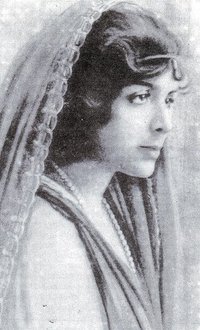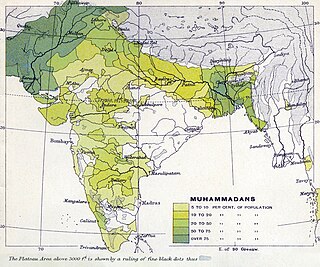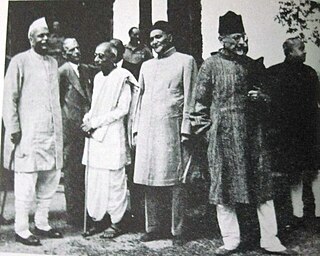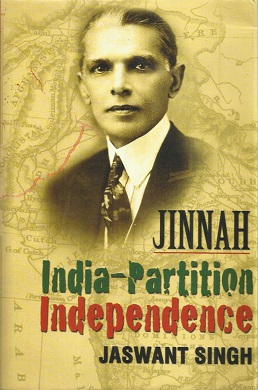Related Research Articles

Rattanbai Jinnah, also known as Ruttie Jinnah, was the wife of Muhammad Ali Jinnah, an important figure in the creation of Pakistan and the country's founder. Additionally, Rattanbai Petit belonged to some of the most influential families of the Indian Subcontinent, the Petit family, through her father; and the Jinnah family through her marriage. Her daughter Dina Wadia married Bombay Dyeing chairman Neville Wadia, of the Wadia family.

Liaquat Ali Khan, also referred to in Pakistan as Quaid-e-Millat or Shaheed-e-Millat, was a Pakistani statesman, lawyer, political theorist, and one of the leading founding fathers of Pakistan. On 15 August 1947, one day after independence, Khan became the first prime minister of Pakistan; he also held cabinet portfolio as the first foreign minister, defence minister, and frontier regions minister from 1947 until his assassination in 1951. Prior to the part, Khan briefly tenured as Finance minister of British India in the Interim Government that undertook independence of Pakistan and India, led by Louis Mountbatten, the then-Viceroy of India.

The All-India Muslim League (AIML) was a political party established in Dhaka in 1906 when some well-known Muslim politicians met the Viceroy of British India, Lord Minto, with the goal of securing Muslim interests on the Indian subcontinent.

Dawn is a Pakistani English-language newspaper that was launched in British India in 1941. It is the largest English newspaper in Pakistan, and also serves as the country's newspaper of record. Dawn is the flagship publication of the Dawn Media Group, which also owns local radio station CityFM89 as well as the marketing and media magazine Aurora.

The Pakistan Movement was an ethnoreligious political movement in the first half of the 20th century that aimed for the creation of Pakistan from the Muslim-majority areas of British India. It was connected to the perceived need for self-determination for Muslims under British rule at the time. Muhammad Ali Jinnah, a barrister and politician led this movement after the Lahore Resolution was passed by All-India Muslim League on 23 March 1940 and Ashraf Ali Thanwi as a religious scholar supported it. Thanwi's disciples Shabbir Ahmad Usmani and Zafar Ahmad Usmani were key players in religious support for the creation of Pakistan.

Dina Wadia was the daughter of Muhammad Ali Jinnah, the founding father of Pakistan and Rattanbai Petit. She belonged to the prominent Jinnah family through her father, the Petit family through her mother, and to the Wadia family through her marriage to Neville Wadia.
Jinnah House is an unoccupied house in Malabar Hill, a premium neighbourhood of the city of Mumbai in India associated with Muhammad Ali Jinnah, the founder of Pakistan. It is also known as South Court and Malabar Hill mansion. It was built by Mohammad Ali Jinnah and remained his main residence for 10 years until he left in 1946 for Karachi.

Wazir Mansion known officially as Quaid-i-Azam Birthplace Museum is a former family home in the Kharadar district of Karachi, Sindh, Pakistan which is considered the birthplace of the country's founder, Muhammad Ali Jinnah.
The Cripps Mission was a failed attempt in late March 1942 by the British government to secure full Indian cooperation and support for their efforts in World War II. The mission was headed by a senior minister Stafford Cripps. Cripps belonged to the left-wing Labour Party, which was traditionally sympathetic to Indian self-rule, but he was also a member of the coalition War Cabinet led by British Prime Minister Winston Churchill, who had long been the leader of the movement to block Indian independence.

The two-nation theory is an ideology of religious nationalism that purports that Indian Muslims and Indian Hindus are two separate nations, with their own customs, religion, and traditions; consequently, both socially and morally, Muslims should have a separate homeland within a decolonised British India. It advocates for Muslim Indian nationhood. Its various descriptions of religio-cultural differenations were the main factor in Muslim separatist thought in India, when it asserted that Indian Muslims and Indian Hindus are two separate nations, with their own customs, traditions, art, architecture, literature, interests, and way of life.

Fatima Jinnah, widely known as Māder-e Millat, was a Pakistani stateswoman, politician, dental surgeon and one of the leading founders of Pakistan. She was the younger sister of Muhammad Ali Jinnah, the founding father and the first Governor General of Pakistan. She was Leader of the Opposition of Pakistan from 1960 until her death in 1967.

Jinnah is a 1998 Pakistani–British epic biographical film which follows the life of the founder of Pakistan, Muhammad Ali Jinnah. It was directed by Jamil Dehlavi, and written by Akbar S. Ahmed and Jamil Dehlavi. It stars Christopher Lee in the lead role as Jinnah.
A Cabinet Mission went to India in 1946 in order to discuss the transfer of power from the British government to the Indian political leadership, with the aim of preserving India's unity and granting its independence. Formed at the initiative of Clement Attlee, the mission contained as its members, Lord Pethick-Lawrence, Sir Stafford Cripps, and A. V. Alexander. The Viceroy of India Lord Wavell participated in some of the discussions.
The Fourteen Points of Jinnah were proposed by Muhammad Ali Jinnah in response to the Nehru report. It basically consisted of four Delhi proposals, the three Calcutta amendments, and demands for the continuation of separate electorates and reservation of seats for Muslims in government services and self-governing bodies. In 1928, an All Parties Conference was convened in reaction to the Simon Commission appointed to discuss parliamentary reform in British India. A committee was set up under Motilal Nehru. That committee prepared a report which is known as "Nehru Report". This report demanded "Dominion Status" for India. Separate electorates were refused and the reservation of seats for the Muslims of Bengal and Punjab was rejected. In this report, not a single demand of the Muslim League was upheld. In reaction to the Nehru Report, Mr. Jinnah was authorized by the League to draft in concise terms the basis of any future constitution that was to be devised for India. Jinnah's aim was to safeguard the interests of Muslims. He, therefore, gave his 14 points. These points covered all of the interests of the Muslims at a heated time and in these 14 points Jinnah stated that it was the "parting of ways" and that he did not want and would not have anything to do with the Indian National Congress in the future. The League leaders motivated Jinnah to revive the Muslim League and give it direction. As a result, these points became the demands of the League and greatly influenced the Muslims' thinking for the next two decades until the establishment of Pakistan in 1947.

The Simla Conference of 1945 was a meeting between the Viceroy of India Lord Wavell and the major political leaders of British India at the Viceregal Lodge in Simla. When it was clear that British intended to leave India, they desperately needed an agreement on what should happen when they leave.

Jinnah: India-Partition-Independence is a book written by Jaswant Singh, a former Finance Minister of India and an External Affairs Minister, on Pakistan's founder Quaid-e-Azam Muhammad Ali Jinnah and the politics associated with the Partition of India. It is currently the latest book written by an Indian politician on the life of Jinnah. The book was released on 17 August 2009 and soon became the subject of controversy, subsequently leading to Singh's expulsion from the Bhartiya Janata Party (BJP). It contains controversial opinions of Singh, claiming that Pandit Jawaharlal Nehru's centralised policy was responsible for partition, and that Jinnah was portrayed as a demon by India for the partition. The book launch ceremony was held at Teen Murti Bhavan in the presence of only a couple of BJP members.

The Quaid-e-Azam House, also known as Flagstaff House, is a house museum dedicated to the personal life of Muhammad Ali Jinnah, the founder of Pakistan. Located in Karachi, Sindh, Pakistan, it was designed by British architect Moses Somake.

The Jinnah family was a political family of Pakistan. Jinnahs have played an important role in the Pakistan Movement for creation of Pakistan, a separate country for Muslims of India. The family held the leadership of All-India Muslim League, and its successor, Muslim League, until it dissolved in 1958 by martial law. Originally from a Gujarati Khoja background, they moved to Karachi from Kathiawar, Bombay Presidency in the 19th century.

Muhammad Ali Jinnah was a barrister, politician and the founder of Pakistan. Jinnah served as the leader of the All-India Muslim League from 1913 until the inception of Pakistan on 14 August 1947, and then as the Dominion of Pakistan's first governor-general until his death. He is revered in Pakistan as the Quaid-i-Azam and Baba-i-Qaum. His birthday is observed as a national holiday in Pakistan.
Jal Ratanji Patel was an Indian physician, who attended to Mohammed Ali Jinnah, the founder of Pakistan, during the years the latter was being treated for Tuberculosis. Patel, who was born into a Parsi family, kept Jinnah's disease a secret which had impact on the Partition of India. In his book Freedom at Midnight, Dominique Lapierre claimed that Patel had handed over a confidential file pertaining to Jinnah, and that Patel kept his patient's condition a secret on the patient's advice. The Government of India awarded Patel Padma Bhushan, the third highest Indian civilian award, in 1962.
References
- ↑ French, Patrick (1998). Liberty Or Death: India's Journey to Independence and Division. Flamingo. p. 61. ISBN 978-0-00-655045-7.
